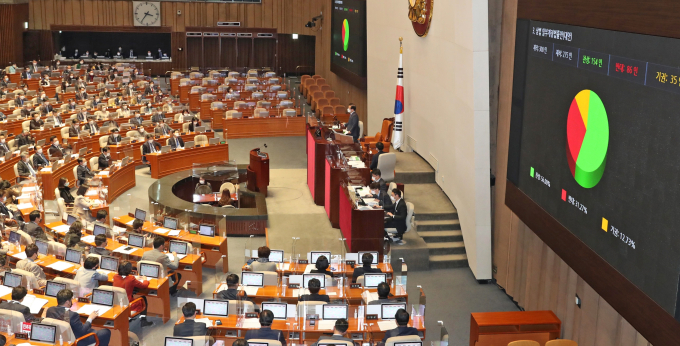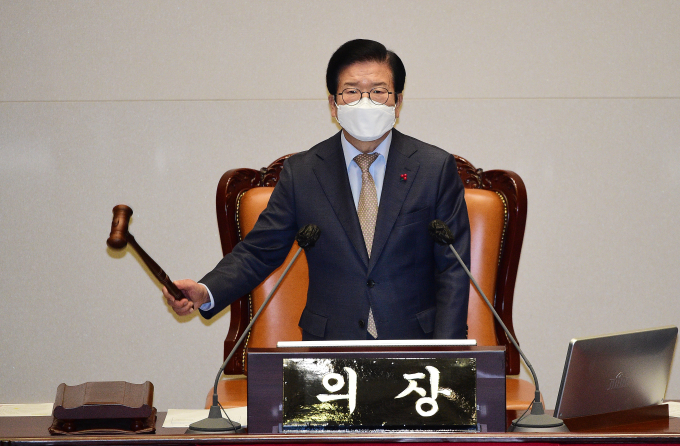Law revisions
Korea’s commercial law revisions irk businesses, limit top shareholders’ clout
By Dec 10, 2020 (Gmt+09:00)
3
Min read
Most Read
Carlyle’s Rubenstein sees commercial real estate undervalued


Infrastructure secondaries continue to rise amid inflation: Stafford


Goldman Sachs names Choi Seoul office chief


Golf equipment maker Taylormade to refinance $222 mn of debt


NPS' former key players move to law firms as its voting power increases



The National Assembly on Wednesday passed a series of commercial law revisions designed to limit business owners’ clout and enhance supervision of conglomerates’ business practices.
But the revisions have irked local businesses, which fear the latest legislative measures could be exploited by speculation from foreign countries, hurting their business activities.
Of the revised acts dubbed as the “three laws of fair economy,” local companies are particularly concerned about the separate appointment of auditors, restrictions on voting rights and the introduction of a multi-level derivative suit.
Under the revised Commercial Act, listed companies are required to pick an auditor from outside their board, by way of a separate election process, to reinforce the independence of the audit committee.
Currently, board members are first appointed at a shareholder meeting and an auditor is later chosen among them. This could put auditors under the influence of business owners.
FIRMS MAY COME UNDER ATTACK WITH REINFORCED 3% RULE
The amendment also limits the voting power of the largest shareholder and related parties to 3% when appointing the auditor. The 3% cap rule was originally proposed to apply to the owner family and related parties in aggregate, but the final version approved at parliament allows them to cast their 3% vote separately.
Still, companies are worried that speculative investors, both Koreans and foreigners alike, could bend the rules to their advantage.
Currently, owner family members and interested parties at most conglomerates, including LG and SK, control their affiliates via a holding company structure with a total stake ranging from 20% to 40%, but when the 3% rule is applied, their management could come under attack from foreign hedge funds, in particular, for their profits.
“If an auditor is appointed by ill-intentioned speculative foreign investors, you cannot rule out possible leaks of key technology and business secrets,” the Federation of Korean Industries (FKI) said in a statement.

ENHANCED CHECK & BALANCE
Businesses said corporate governance and transparency in the decision-making process have improved by introducing steps aimed at keeping business owners‚Äô activities in check.¬Ý
According to data from the Fair Trade Commission on Dec. 9, the rate of business owners of 49 conglomerates holding key board posts dropped to 16% this year from 17.8% in 2019. The number of affiliated companies with an audit committee has increased to 266 from 250 in the same period.
The backlash from the corporate sector also derives from eased requirements for exercising minority shareholders’ rights, allowing them to raise issues and proposals if they hold stakes between 1% and 3%.
The provision, however, makes things complicated given certain lower court decisions of late that required minority shareholders of a listed company to hold shares for at least six months before exercising their rights.
Wednesday’s law revision has also introduced a multi-level derivative suit.
If a director of a subsidiary inflicts a loss on the subsidiary due to a breach of fiduciary duty, the shareholders of the parent company may file a lawsuit against the director in breach.
To do so, the shareholder that files a complaint must have at least a 0.5% stake for listed firms and 1% for non-listed firms.
“This will only lead to more lawsuits, damaging corporate images,” said the FKI.
MORE FIRMS UNDER WATCHDOG’S SCRUTINY
Another law that affects conglomerates is the revised Fair Trade Act, under which an increased number of big companies will be subject to stricter regulations on inter-affiliate business deals and heavier penalties for violators.
In the past, the regulation applied to listed companies at least 30% owned by group chiefs and their families and 20% for unlisted firms. But under the new legislation, the threshold is set at 20% for both cases.
With the change that takes effect from the end of 2021, some 24 companies including Samsung Life Insurance, Hyundai Glovis, SK Corp and Hanwha will be banned from inter-affiliate dealings, while an additional 381 firms will come under the trade watchdog’s scrutiny for violations.
Wednesday's passage of the revised laws was led by the ruling Democratic Party, which holds a majority of the 300-member legislature.
Write to Hyung-Suk Song, Byung-Uk Do and Su-Bin Lee at click@hankyung.com
In-Soo Nam edited this article.
More to Read
Comment 0
LOG IN







